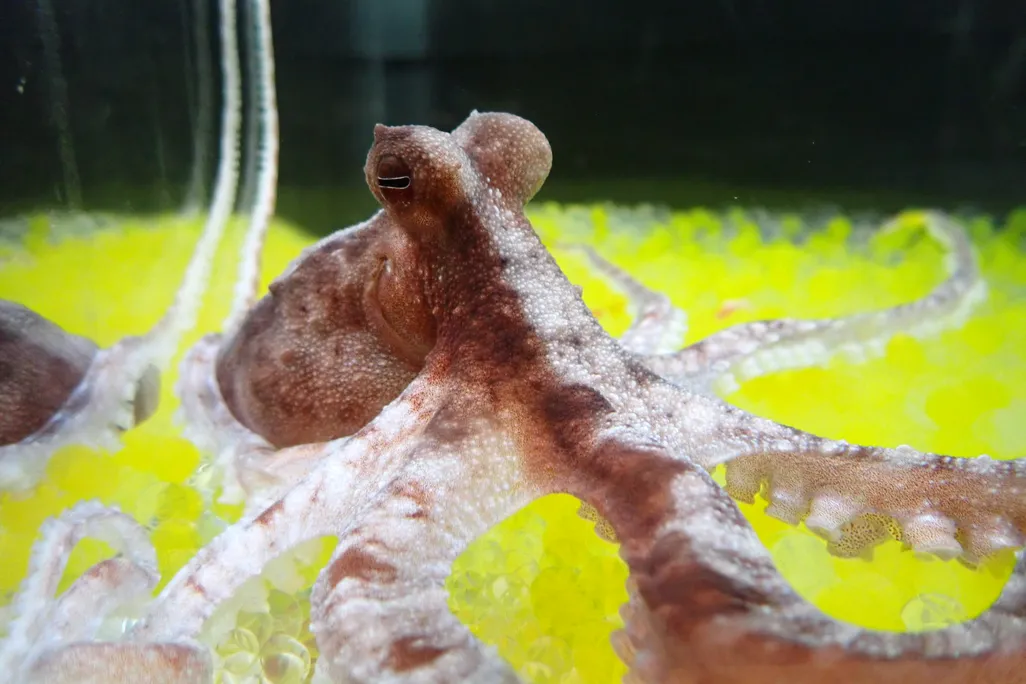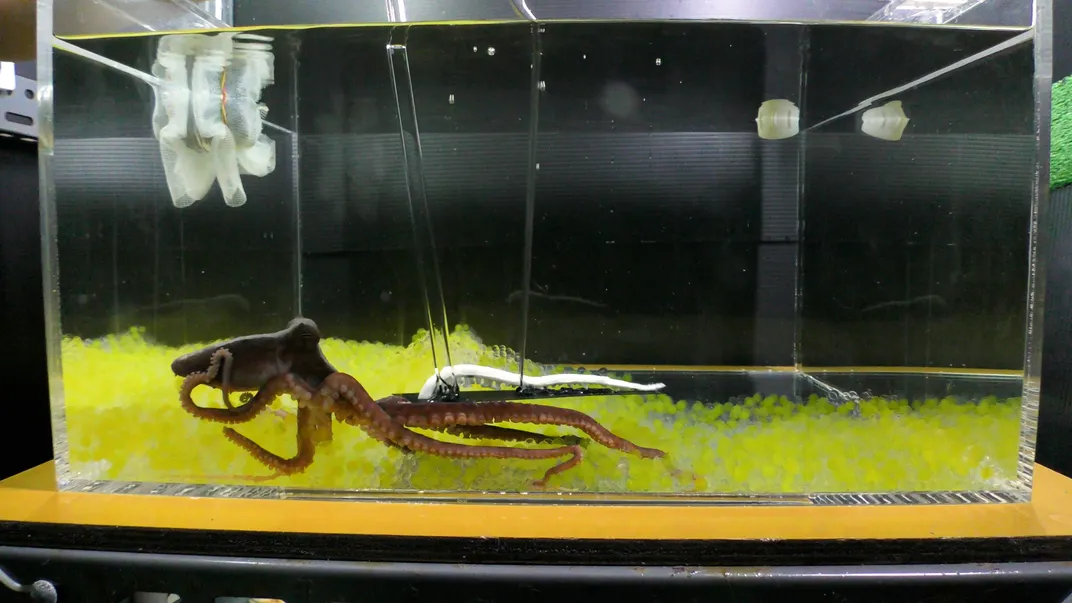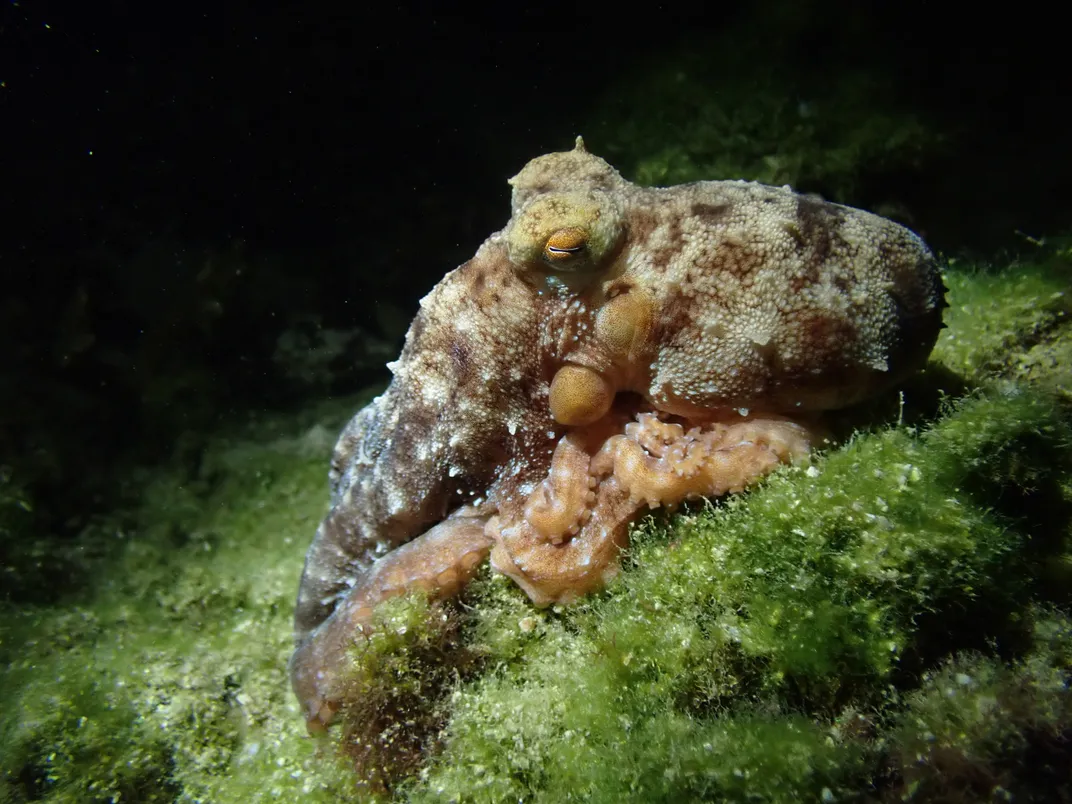Octopuses Fall for the Rubber Hand Illusion, Just Like Humans, Pointing to a Sense of Body Ownership
The trick that plays with awareness of one’s own limb appeared to fool all six of the cephalopods tested in a series of experiments

Octopuses, they’re just like us: New research suggests the eight-armed cephalopods are also fooled by a version of the rubber hand trick.
In humans, this illusion involves covering a person’s hand so they can no longer see it, then placing a realistic-looking rubber hand next to it. When both are touched simultaneously, many individuals begin to “feel” the sensations in the fake hand—and feel like the alien appendage is their own.
The illusion is more than just a fun party trick: First described in 1998, scientists say it sheds light on the interaction between vision, touch and proprioception, or the body’s ability to sense its position and movement in space.
Fun fact: Octopus smarts
Compared to their body size, octopuses have large brains. They’ve been known to navigate mazes, solve puzzles for food rewards and team up with fish to hunt.
Since then, researchers have taken the rubber hand illusion and run with it. Other studies have found that mice and monkeys also fall for the trick. Now, in a new paper published in the journal Current Biology, scientists report that plain-body octopuses (Callistoctopus aspilosomatis) are fooled by the illusion as well. It’s the first recorded instance of a non-mammal animal being stymied by the ruse, reports Science’s Jasmin Galvan.
“It suggests that octopuses have quite a rich body image,” says Peter Godfrey-Smith, a researcher at the University of Sydney who was not involved with the study, to New Scientist’s James Woodford.
To test the illusion’s effect on the soft-bodied mollusks, scientists placed a single plain-body octopus into an experimental tank. They also created a model octopus arm out of a soft gel, then attached it to an opaque partition.
During the experiments, they placed the partition over one of the octopus’s real arms, so the animal could see the decoy, but not its real arm. Then, the scientists used plastic calipers to stroke both at the same time for roughly eight seconds. Next, they stopped touching the real arm and used stainless steel tweezers to pinch only the fake arm.
Researchers ran this test multiple times with six octopuses. When the experimenters pinched the “rubber arm,” all of the cephalopods reacted defensively. They changed their body color, retracted their real arm, changed their posture or swam away, often exhibiting several of these behaviors at the same time. This is exactly how researchers would expect an octopus to behave if one of its real arms got pinched in nature, they write in the paper.

The scientists conducted similar experiments to confirm their initial findings. In some instances, they positioned the alien limb in a way that did not match the posture of the real arm. In others, they stroked the fake arm and the real arm at different times or simply did not stroke either. During these experiments, the octopuses did not act defensively, which supports the finding that they were fooled by the illusion.
The results suggest the cephalopods have a similar sense of body ownership as humans and other mammals, which emerges from multi-sensory signals such as sight and touch. This means octopuses, like humans, know their limbs belong to them, a perception that is “fundamental” to self-consciousness, the researchers write in the paper.

In the future, scientists might be able to use octopuses as a model for studying the evolution of this perplexing sense. Though this adaptation is probably beneficial to survival in some ways, the ability to be tricked is also evidence of a flaw in the way the brain processes information, study co-author Yuzuru Ikeda, a researcher at the University of the Ryukyus in Japan, tells New Scientist.
The findings might be helpful for other types of research, too. For example, the octopus insights might one day help engineers develop better robots and artificial intelligence systems, reports Phys.org’s Paul Arnold. Or, they could be helpful to doctors treating certain neurological disorders in humans, such as asomatognosia, a condition that causes a patient to feel like a body part is missing.



